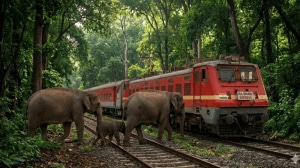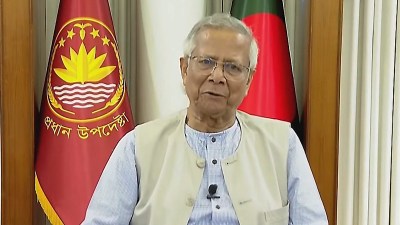From bureaucrat to agri-tech pioneer, how Hardip Singh Kingra is sowing change ‘in a suit and tie’ without using soil for farming
Hydroponic farming, where plants grow without soil and are fed through nutrient-rich water, uses up to 90 per cent less water than traditional farming
 Dressed in formal attire — as if heading to an office job rather than working in the fields — he is leading Punjab’s hydroponic revolution (Express Photo)
Dressed in formal attire — as if heading to an office job rather than working in the fields — he is leading Punjab’s hydroponic revolution (Express Photo)After retiring as an Additional Secretary to the Government of India in 2013 and having served as an Director of International Cooperation while travelling to 36 countries, Hardip Singh Kingra could have opted for a peaceful post-retirement life after his stint as an Indian Forest Service (IFoS) official. Instead, he embarked on an entirely new mission — one that is now transforming the future of farming in Punjab.
In his new avatar as an agri-tech pioneer, Kingra does not touch soil, nor does he use traditional agricultural equipment like tractors, any other farm implements or even soil. Dressed in formal attire — as if heading to an office job rather than working in the fields — he is leading Punjab’s hydroponic revolution.
From his humble beginnings at a village- Kamiana, school in Faridkot district to studying at Oxford University, and a career where he led high-level delegations and served as Protocol Officer to global dignitaries including the prime ministers of the UK and Australia, and Prince Andrew, Kingra’s life has always been defined by purpose. In 2019, that purpose took a decisive turn toward agriculture — specifically, hydroponic farming — growing plants without the use of soil.
“Agriculture was always close to my heart. After retirement, I had the time to follow my passion, but I wanted to do something different,” says Kingra. “Conventional farming comes with huge risks from natural calamities, is heavily dependent on weather conditions, and consumes excessive resources. My focus was on low-risk farming with minimal use of water and other inputs — and to prove that farming doesn’t mean that a farmer must toil in dhoop and mitti. I wanted to farm as if going to an office — in a suit and tie”.
After extensive research and learning, Kingra launched his first hydroponic project in 2019 at his native village, Kamiana in Faridkot, starting with just 1,400 square meters. Today, that project has expanded and he opened his second unit in 4,000 square meters under protected cultivation in Tiwana village near Lalru in Mohali. His is now Punjab’s first and largest hydroponic farm, using advanced systems like NFT (nutrient film technique) and grow bags.
“There are several methods of doing hydroponic farming — one must decide according to their needs, crops and climate. At our farm, a poly house, we use NFT and grow bag systems,” he said. “Hydroponics is exactly the kind of farming I wanted to do — there’s no soil involved, and it’s largely neutral to natural calamities. Unless a calamity is extremely severe, this is a safe method of farming.”
Hydroponic farming, where plants grow without soil and are fed through nutrient-rich water, uses up to 90 per cent less water than traditional farming.
“Each crop gets exactly what it needs — no more, no less,” Kingra explains. “We control nutrients, light, temperature, wind, and even influence taste, shelf life, and harvest time. Automation can be as basic or advanced as needed, depending on the farm’s size, crops, and area.”
Unlike conventional farming, there is no surface contamination. Plants are densely spaced — twice than seen in traditional farming — but flourish because they do not compete for nutrients as it happens in traditional farming. Inside poly houses, micro-climates are managed to allow year-round cultivation.
Among the crops grown are cucumbers, bell peppers, cherry tomatoes, strawberries, Japanese muskmelon, salad greens, and even people are growing hydroponic fodder for dairy animals. “We use high-quality seeds — costlier than those in conventional farming — but the returns are equally high,” he notes. “Our cherry tomatoes sell at Rs 300 per kg and muskmelons at Rs 400 each. In Punjab, muskmelons usually grow between April and early June, but we can grow them anytime. Their taste and nutrition are far superior because we care for each plant individually.”
At Kingra’s farm, PVC pipes — specifically unplasticised PVC (uPVC) for its non-toxic, chemically stable properties — form the framework and channels for nutrient flow. These pipes, perforated with planting holes, can be arranged vertically or horizontally. A circulatory system ensures the water flows continuously, delivering nutrients directly to each plant.
The model is scalable. Marginal farmers can start with 1,000 square metres using NFT systems for about Rs 40 lakh, or grow bag systems for Rs 30 lakh. The National Horticulture Board offers a 50 per cent subsidy for farms of 2,000 square metres, and the State Horticulture Mission provides subsidies for smaller units.
The set-up includes a poly house, drip irrigation, NFT or grow bags, cocopeat, and power arrangements. Returns can reach up to Rs 10 lakh per acre annually, with net earnings between Rs 6–7 lakh if the farmer contributes personal labour. “Even with two labourers and costs for seeds, nutrient solutions, and packaging, profits are good. The key is market access and proper training — never start hydroponics without it,” warns Kingra, adding that “hydroponics is precision agriculture. If you’re not trained, don’t even attempt it,” he says.
His farm offers training to farmers from across India and even abroad. “Even uneducated people are running such units successfully because they are properly trained,” the retired bureaucrat said.
To spread awareness, he has created 52 educational videos and put on his YouTube channel ‘@theleafhydroponicfarm’ (The Leaf Hydroponic Farm’ as the Leaf is the brand name of their products. The Leaf hydroponic Farmand conducts training sessions.
Kingra’s farm runs on RO water, with nutrients like calcium nitrate, magnesium sulphate, potassium nitrate, and phosphate added in precise quantities. “We use no urea, no DAP — only safe, necessary nutrients,” he stresses. Water circulates in a 10,000-litre system operating on a two–three day cycle. The farm also uses organic media like Light Expanded Clay Aggregate (LECA).
To illustrate water savings, Kingra says: “The amount of water needed for 1.5 acres of conventional farming can irrigate 16 acres of hydroponics.”
Also, he has successfully grown strawberries, with trials for blueberries underway. By eliminating pesticide use, hydroponics at his farm delivers cleaner produce, longer shelf life, and better taste.
He acknowledges the skepticism around non-soil farming. “People think hydroponics is unnatural, but it’s actually cleaner and more controlled. In the US, hydroponics is even certified organic,” he points out.
There’s also a cultural message embedded in his work. “We follow Guru Nanak’s principles of honest living and sustainability. The common belief that kisan nu mitti naal mitti hona hai kheti karn vaste (a farmer needs to be deeply connected with the earth to successfully do farming) is something we are proving wrong.”
His brand, The Leaf, is internationally approved, with products packaged and sold through major brands like Reliance, More, Big Basket, and family networks — bypassing traditional mandis to maintain quality control.
“For me, this journey is not just about growing crops but redefining agriculture for the 21st century. As India faces climate change, water scarcity, and rising food demand, innovations like hydroponics are proving that with science, passion, and supportive policies, this farming can indeed be future and even a marginal farmer can earn a huge profit from this,” he concluded.







